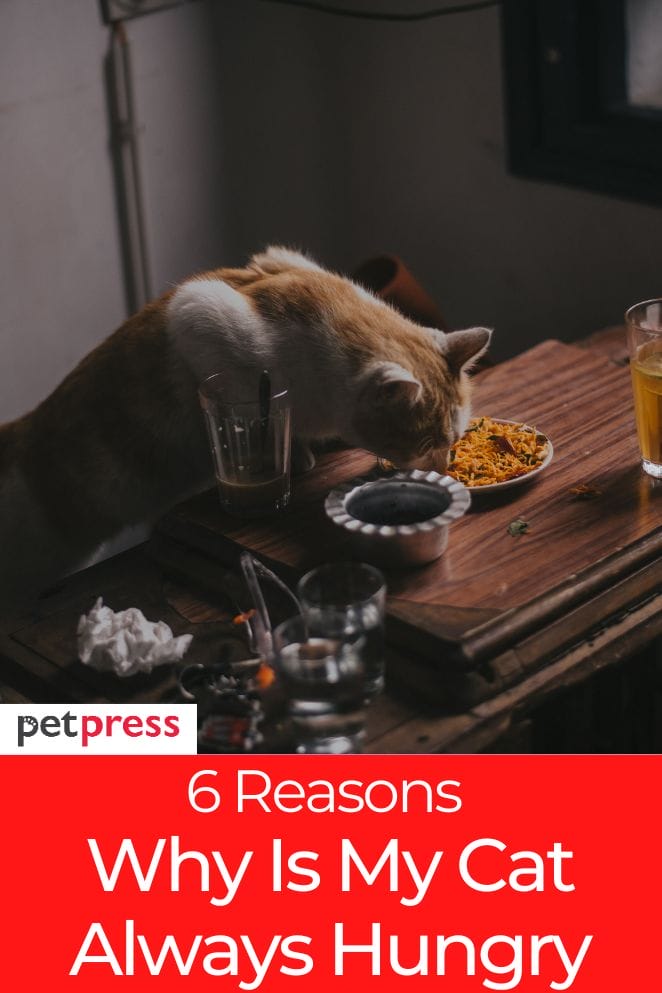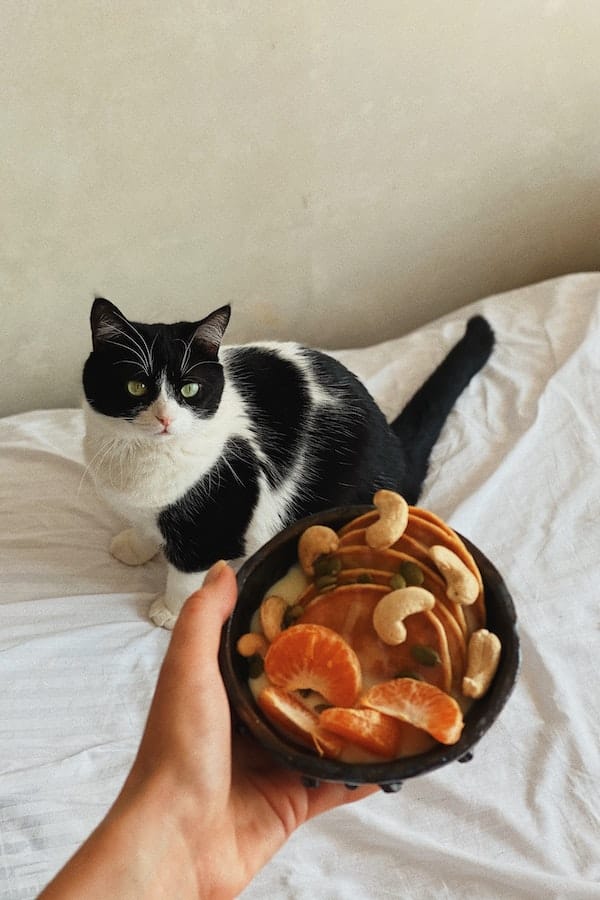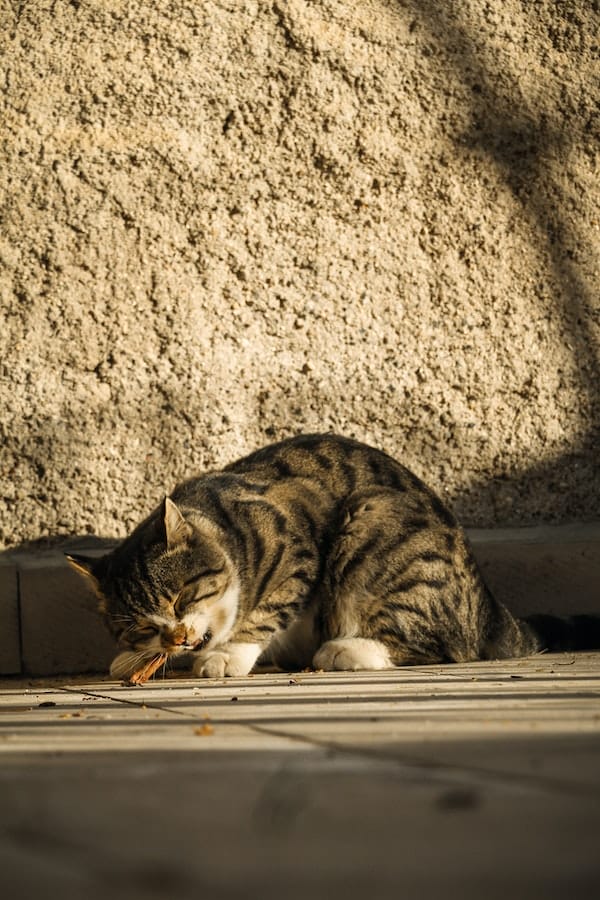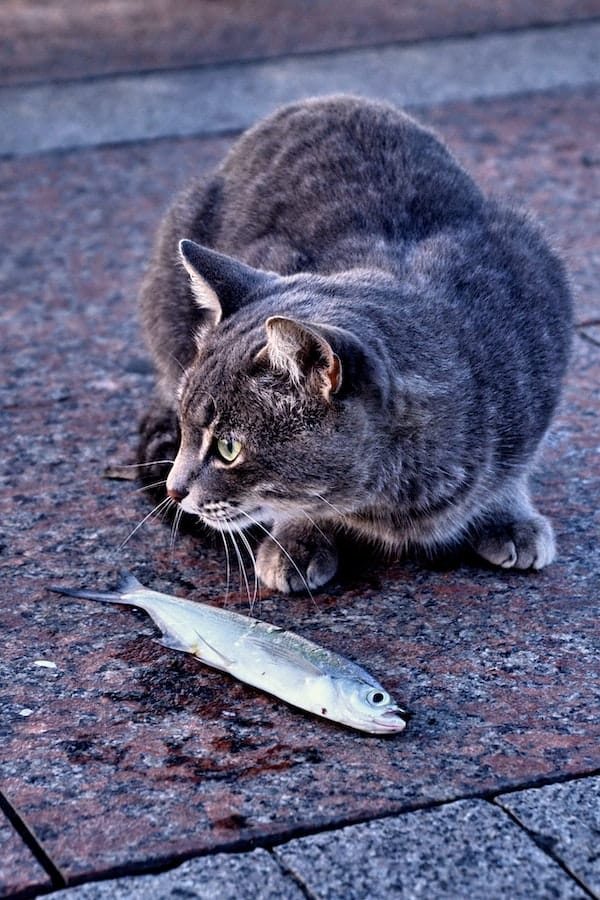
Cats are known for having hearty appetites, but sometimes a cat’s appetite can seem insatiable.
If your cat is always asking for more food, it might be hard to keep up with its demands.
Fortunately, understanding why cats get hungry so often can help you better manage their diet and ensure they’re getting the well-balanced nutrition they need.
This article will explore some of the potential causes of why your cat is always hungry and how you can help them satisfy their hunger in healthier ways.
What are the causes of constant hunger in cats?

There are several potential causes for your cat’s constant hunger. These includes:
Not enough calories
If your cat is not getting enough calories in its diet, it can lead to constant hunger.
If you are feeding your cat only dry food, then the cat may not get all the nutrients and energy it needs to feel full.
It’s important to make sure that whatever type of food you are giving your cat meets its nutritional needs, including providing them with enough calories.
Wet food can be a good way to make sure your cat is getting enough calories and hydration.
Food intolerances or allergies
If your cat has an intolerance or allergy to certain ingredients in its diet, it may cause them to be hungrier than usual.
Intolerances and allergies can lead to inflammation in the digestive tract, which can reduce the number of nutrients absorbed by your cat.
It’s important to consult with a veterinarian if you think your cat has intolerance or allergy so that you can switch their diet accordingly.
Aging
As cats age, their metabolism typically slows down and they may not be able to absorb as many nutrients from food.
This can make them feel hungrier than usual so they are still getting the nutrition they need.
It’s essential to adjust your cat’s diet accordingly as it ages so it is getting enough calories and other essential nutrients.
Medical Conditions
There are also certain medical conditions that can cause cats to feel excessively hungry, such as diabetes or hyperthyroidism.
If you suspect your cat may have an underlying medical condition causing its constant hunger, it’s important to take them to the vet for a check-up.
Stress and anxiety
Stress and anxiety can also be a factor when it comes to cats feeling excessively hungry.
Cats may indulge in comfort eating when they are feeling anxious or stressed, which can lead to overeating and constant hunger.
If you think your cat’s hunger might be caused by stress, then it’s essential to look for ways to reduce their stress levels, such as providing a calm environment and spending quality time with them.
Diet changes
Diet changes can also lead to cats feeling hungrier than usual.
Cats need time to adjust when their diet is changed, and during that adjustment period, they may feel hungrier than normal as their body adjusts to the new food.
It’s important to introduce any changes slowly and gradually, as this can help them get used to the new food more easily.
How to help your cat satisfy their hunger?

Once you have identified the potential causes of your cat’s constant hunger, there are some steps you can take to help them satisfy their hunger in healthier ways. These include:
Providing a balanced diet
It is important to provide your cat with a well-balanced and nutritious diet that meets all of its nutritional needs.
Make sure to choose a diet that is high in protein and low in carbohydrates, as this can help them feel full for longer.
Also, make sure to provide your cat with enough calories per day, as this can help reduce its constant hunger.
Monitoring their food intake
Monitoring your cat’s food intake is a great way to ensure that it is getting enough calories and nutrients each day.
You can do this by weighing out the appropriate portion sizes of food for your cat’s size and age and then tracking their weight to ensure they are not gaining or losing too much.
Incorporating wet food
Incorporating wet food into your cat’s diet can be a great way to make sure they are getting enough hydration and calories.
It also helps to keep them feeling full for longer, as it is more nutrient-dense than dry food.
Reducing stress levels
If you think that stress or anxiety might be causing your cat to feel excessively hungry, then it is important to look for ways to reduce its stress levels.
This can include providing them with a calm and secure environment and spending quality time with them each day. You may also need to consult with a professional if the stress persists.
Exercising and playing
Exercising and playing with your cat is an important part of helping them stay healthy and satisfied.
Regular playtime can help stimulate their minds and provide a physical activity that can reduce their hunger levels.
You can also use interactive toys to keep them occupied and engaged during playtime, as this can prevent boredom that might lead to overeating.
Providing treats in moderation
Providing your cat with treats in moderation can also be a great way to satisfy its hunger and provide them with some extra nutrition.
However, it is important to make sure that the treats are healthy and not full of added sugar or other unhealthy ingredients.
Visit the vet for a checkup
If your cat is still feeling excessively hungry and you have ruled out any potential causes, then it may be a good idea to take them to the vet for a check-up.
The vet will be able to perform some tests to determine if there are any underlying medical issues causing the constant hunger.
They may also be able to recommend some dietary changes that can help to reduce your cat’s hunger levels.
Conclusion

Cats can feel excessively hungry for a number of reasons, and it is important to identify the cause before trying to help them satisfy their hunger.
If your cat is feeling hungrier than usual, then it could be due to changes in its diet, stress levels, or exercise routine.
Making small adjustments such as providing a balanced diet, monitoring food intake, incorporating wet food, reducing stress levels, exercising and playing regularly, and providing treats in moderation can all help to reduce your cat’s hunger.
If the problem persists, then it may be a good idea to take them to the vet for a check-up.
With some patience and care, you can help your cat satisfy their hunger in a healthy way. Thank you for reading!


GIPHY App Key not set. Please check settings